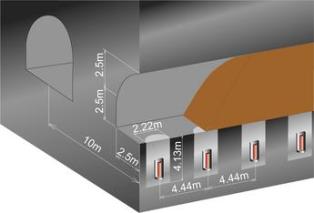A Japanese town has put itself forward to possibly host the country's high-level radioactive waste storage facility. Toyocho, in Kochi prefecture, is the first to respond to a 2000 government invitation.
 According to Japanese newspapers, Toyocho leaders have submitted their notice of interest to Japan's Nuclear Waste Management Organization (NUMO), which has been open to suggestions for six years. Toyocho is in Kochi prefecture in the south east of the prefecture.
According to Japanese newspapers, Toyocho leaders have submitted their notice of interest to Japan's Nuclear Waste Management Organization (NUMO), which has been open to suggestions for six years. Toyocho is in Kochi prefecture in the south east of the prefecture.
NUMO is meant to compile a shortlist of potentially suitable sites during 2007, before completing detailed investigations of each by 2012. Selection of a site should be made by around 2025, with a facility operating in 2035.
The main characteristic for a suitable site would be stable bedrock for storage of radioactive packages over very long timescales. Researchers are currently investigating the use of sedimentary rocks at a depth of about 500 m and igneous rocks at 1000 m at laboratories at Hokkaido and Mizunami respectively.
It is Japanese policy to recycle used nuclear fuel, so the only large volumes of high-level wastes that require storage are unusable waste products that are encased in glass (vitrified).
This recycling has historically been carried out in France at La Hague and in Britain at Sellafield, but Japan Nuclear Fuels is now commissioning its own facility at Rokkasho to carry out the work and combine reusable materials into fresh reactor fuel.
Basic Japanese disposal concepts would see about 20 canisters of vitrified waste encased in a steel cask. That would then be embedded underground, using bentonite clay to seal it into the bedrock. Once scientists were comfortable that the waste facility would perform its function well, access tunnels would be filled by clay and the facility closed.
Further information
WNA's Nuclear Power in Japan information paper
WNA's Japanese Waste and MOX shipments from Europe information paper
WNA's Radioactive Wastes information paper
WNN: First Japanese mixed oxide powder produced
Toyocho asks for waste
A Japanese town has put itself forward to possibly host the country's high-level radioactive waste storage facility. Toyocho, in Kochi prefecture, is the first to respond to a 2000 government invitation.




_30199.jpg)
_72306.jpg)

_49562.jpg)





